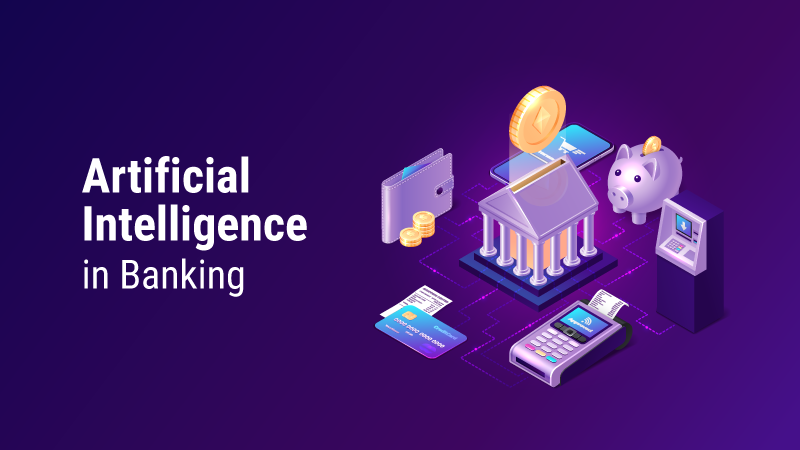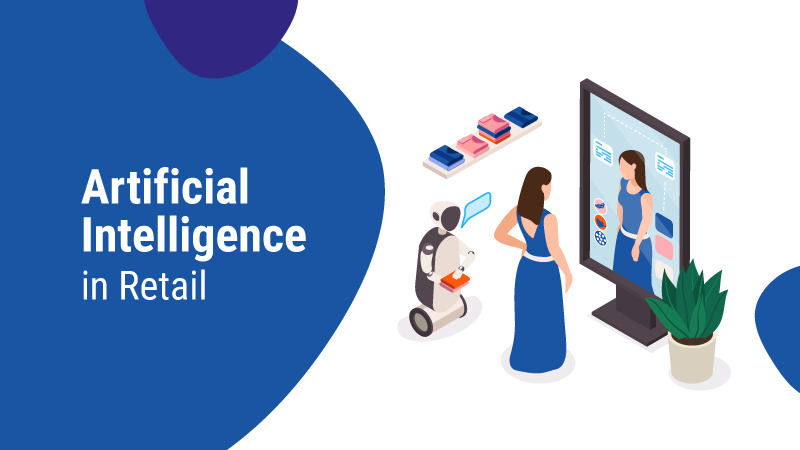Artificial Intelligence in Banking

Industries are going behind new methods to adapt to changing preferences of the customer and to cope with the pace of emerging needs and demands. The banking sector is going through digitalization at a much faster pace. The flow of the operational process is clearly integrated with Artificial Intelligence, Machine learning, and Robotic Process Automation solutions. The end result of incorporating these technologies brings significant gains because AI is capable of improving processes virtually in all areas of banking. From back-end automation to front-end operations, AI offers significant benefits to the banks that implement it. AI includes a range of technologies, from fully machine-powered or autonomous intelligence to aided or enhanced intelligence. Some relatively simple AI tools such as Intelligent Process Automation (IPA) have already been implemented in banks.
Uses of Artificial Intelligence in Banking
Here are some of the major use cases or applications of artificial intelligence in the banking sector.
Fraud detection and cyber security
Fraud detection is one of the most relevant functions of artificial intelligence. Every day, a large number of digital transactions take place, with customers paying bills, withdrawing money, and depositing checks, and there is another bundle of transactions happening through apps or websites. Therefore, there is a growing need for the banking sector to increase its cyber security and efficiency to detect fraud. Since banking facilities have become more accessible with advancements in technology, it has also increased the chance of fraudulent activities occurring in these services.
The machine learning capabilities of AI enable easy detection of fraud more accurately than any expert professional, thus offering security in online banking services. AI can track any loophole or unusual activity in the system and notify customers and banks to eliminate risk or damage associated with it. The monitoring capabilities of Artificial Intelligence also enable banks to deal with cyber-attacks in the banking sector before it reaches the internal system, employees, or customers.
Chatbots
Maintaining an effective customer relationship is very important for many businesses and the banking sector is not an exclusion. It will not be easy to deal with customers, answering every single query of them, especially when there are more important tasks to be done. But with a chatbot, all these things can be managed easily as it significantly eliminates the need to maintain and operate call centers. Chatbots, once deployed, will be able to work 24 * 7 as they will not get tired or take recess as human employees do. These bots easily understand the needs of a user efficiently and provide improved customer support. Chatbots learn from customer interactions and train themselves to improve their efficiency. Integrating chatbots with banking services ensures that customers can reach out to the bank’s support at any time of the day. Moreover, chatbots deliver personalized support to each customer after analyzing their behavior and suggesting the best financial services according to their requirements.
Track marketing trends
A large volume of data is always a part of banking institutions and it is artificial intelligence that helps banks to process such a huge volume of data AI also makes predictions regarding emerging trends, currencies, and stocks. The AI-based machine learning technology in banking helps to assess market sentiment, recommend options to make investments, and suggest the best time for investing in stocks. and warns if it identifies any potential risk. Because of the great data processing capacity of AI technology, it helps to accelerate decision-making and facilitate smooth business for banks and their clients.
Loan and credit support
Banks have begun to integrate Artificial Intelligence solutions to make loan and credit decisions more secure, informed, and profitable. Many banks still take account of credit history, credit score, and references in determining the creditworthiness of a person or an organization. However, sometimes these credit reporting systems are delivering inaccurate and riddled data with errors. There are chances for loss of original transaction history and misrepresentation of creditors. AI-based loan and credit systems decide the creditworthiness of customers by analyzing the behavior and pattern of their credit history. In addition, the system sends alerts to banks about certain customer behaviors that show the likelihood of default.
Risk management
The banking sector is often affected by many external global factors like natural disasters, political disparities between countries, fluctuations in exchange rates of currencies, etc. Making crucial business decisions requires extra cautiousness, especially during such complex and unpredictable situations. AI-based analytics will help you to get a clear idea about things that are yet to come, to remain prepared, and to make wise decisions. AI identifies risky applications by assessing the likeliness of a client failing to repay a loan. This kind of prediction is made by analyzing previous behavior patterns and data in the client’s smartphone.
Regulatory compliance
If we list the most regulated sectors of the world economy, the banking sector would be holding the top place. Governments have introduced a certain kind of regulatory control over banking institutions to make sure that customers do not take advantage of banks to commit financial crimes. Such compliances also ensure that banks maintain acceptable risk profiles to rule out large-scale defaults. Most banks have comprised an internal compliance team that handles such issues, but these processes are more time-consuming and need large investments when it is performed manually.
The compliance regulations on banking institutions are subject to change from time to time, and banks are required to comply with these regulations and update their processes and workflows regularly. It is true that AI Banking cannot take up the role of a compliance analyst but it will assist them in making operations faster and more efficient.
Wrap Up
Every business is going through a digital revolution that is affecting the functionalities of many sectors in different ways. Just like any other sector that focuses on embracing the revolution to gain profits, banking is also in a position. the uses or applications we have discussed here give a clear picture of what artificial intelligence has in store for banking. Though it mainly aims at improving customer relationships and automating complex processes, AI never fails to attend to the challenges faced by banking institutions due to digitalization.
Get Started with our AI ServicesRead more about AI
- Artificial Intelligence in E-commerce
- 7 Real-World Applications of Deep Learning
- Artificial Intelligence in Marketing
- Artificial Intelligence in Finance
- Artificial Intelligence in Everyday Life
- Artificial Intelligence in Insurance
- Artificial Intelligence in Transportation
- Artificial Intelligence in Fintech
- Artificial Intelligence in Cyber Security
- Artificial Intelligence in Logistics
- Artificial Intelligence in Manufacturing
Blogs by Category
AppForms Artificial Intelligence Blockchain Call Centers Chatbots Cloud Computing Data Management Design Digital Marketing Digital Transformation Enterprise Applications FinTech Insights LowCode Development Microsoft Mobile Apps News Office 365 Robotic Process Automation Security SharePoint Software Development Web ApplicationArtificial Intelligence in Retail

2024-05-23 14:12:28